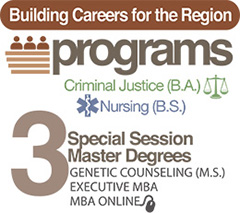The Achievements: The regional center in Stockton introduced a self-support, accelerated, full-time nursing program that allows those with a baccalaureate in another field to gain an RN and a baccalaureate in nursing in 17 months. This provides one path back into the workforce. At the same time, Stanislaus has collaborated with Kaiser Permanente and other healthcare providers to develop a baccalaureate in management and leadership in the health professions that will respond to future changes in state regulations and licensure requirements. This collaboration was made possible in part by the agility of Stanislaus’s self-support. In addition, Stanislaus has worked with San Joaquin Community Mental Health Services to fund and develop the “Wellness Works” program, which provides support and counseling for those most seriously impacted by long-term unemployment. Creating this program and providing the training takes advantage of Stanislaus’s ability to organize off-campus programs funded by an outside partner.
Stanislaus also has a very active service-learning program, for which it uses its self-support capacity. In 2011–12, some 775 students participated in service-learning projects, providing over 46,000 hours of service to the community. The estimated value of these services to the local economy was in excess of $1,000,000. More recently, in November 2012, nearly 200 students, faculty, and staff assisted the Friends of United Samaritans’ fundraising dinner. As a result, meals will be provided for nearly 70,000 individuals.
Looking to enhance employment options for those working in agriculture, Stanislaus has convened a food industry group to plan an innovative certificate program in food safety. This program will help local employers develop and advance their in-house staff to meet the ever-changing challenges of food regulations and safety.
In a relatively short time, Stanislaus has launched several new projects at the Stockton center,
including two career-focused baccalaureate degree completion programs. To make its programs accessible at the Center, at employer sites, and beyond, Stanislaus is engaging its self-support capacity to offer a variety of accelerated, online and hybrid formats, and evening or weekend schedules.
The Model Extended: Drawing on all its capacities––self-support, state-support, service learning, applied research, grants, and more––along with its role as convener and consensus builder, any CSU campus can use similar strategies to respond to a regional crisis with speed, agility, and significant impact, both immediate and long-term. If it is willing to reach out into the community, a campus serving a region facing economic challenges can be the driving force in economic change. With its self-support capacity, it can create degree, certificate, and training programs, manage them well, and deliver them in various modes and at various sites as needed. It can thus respond in a timely fashion to an emerging economy and changing employment opportunities.








